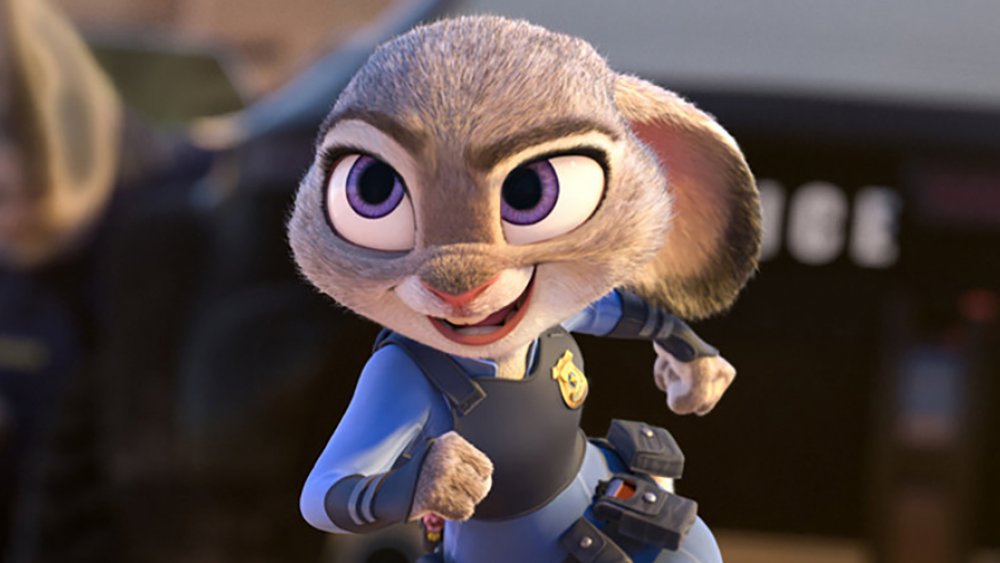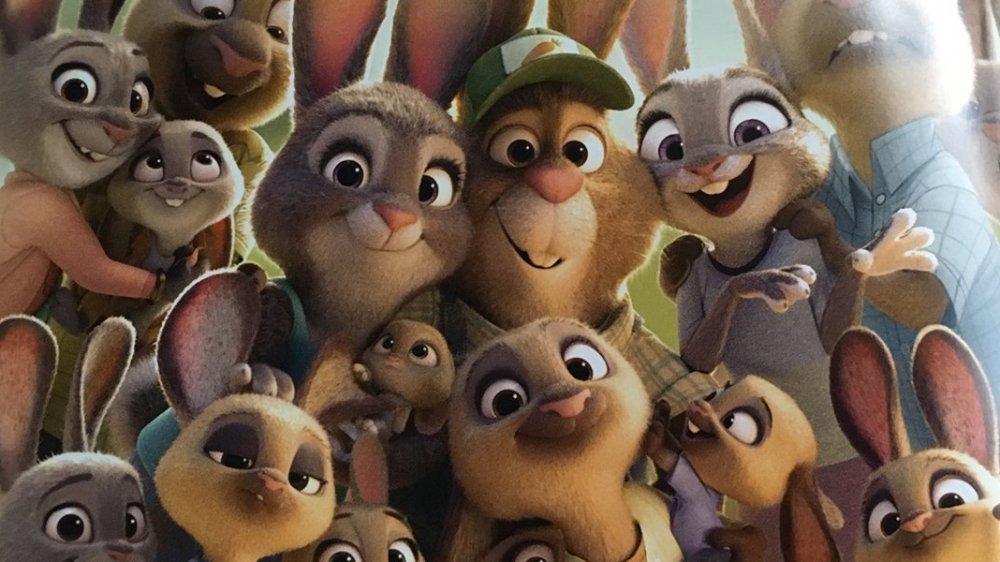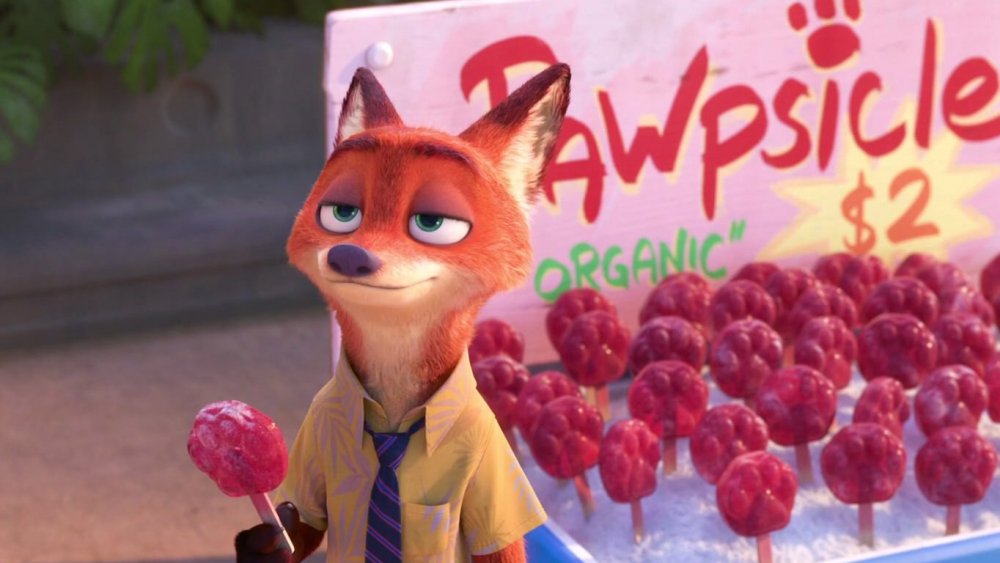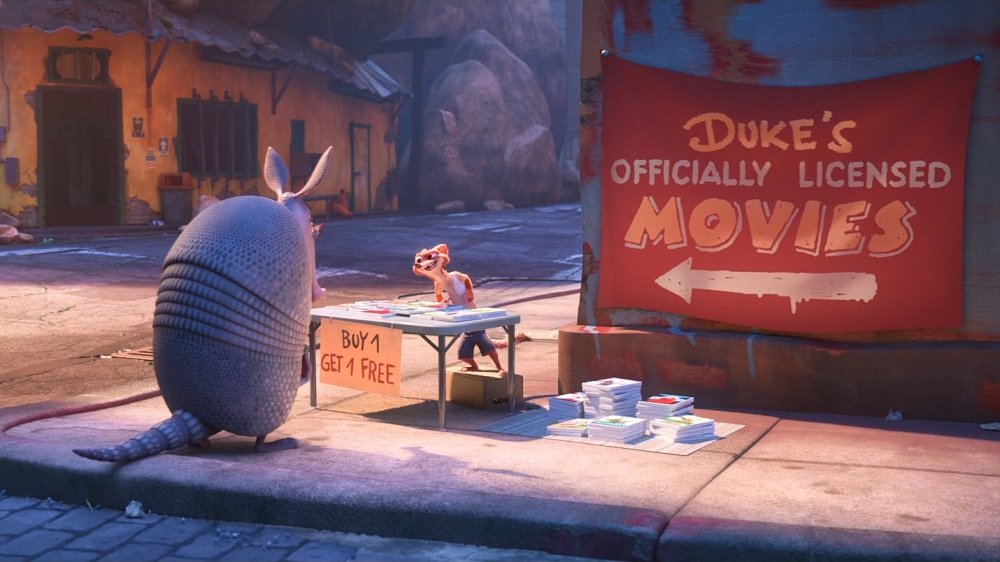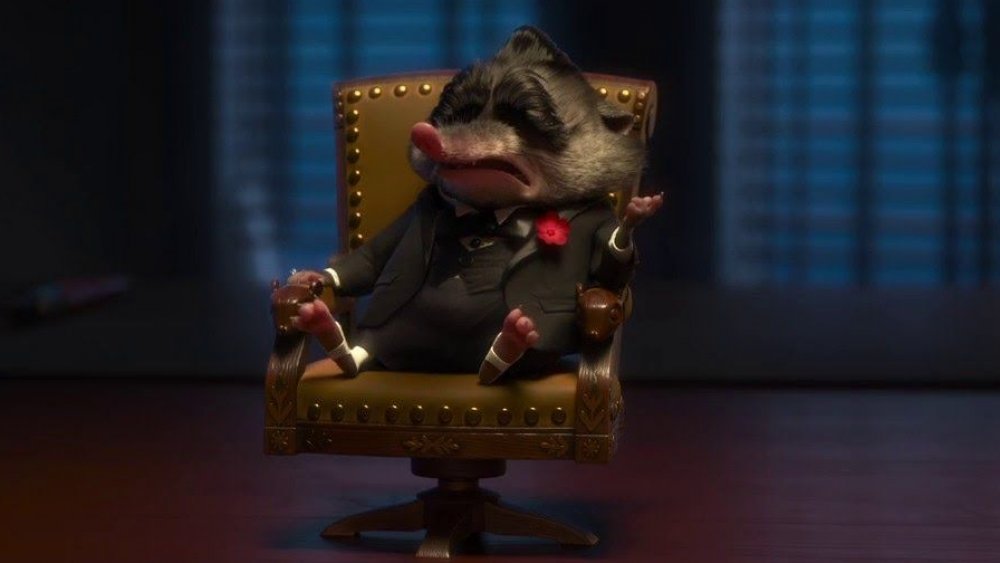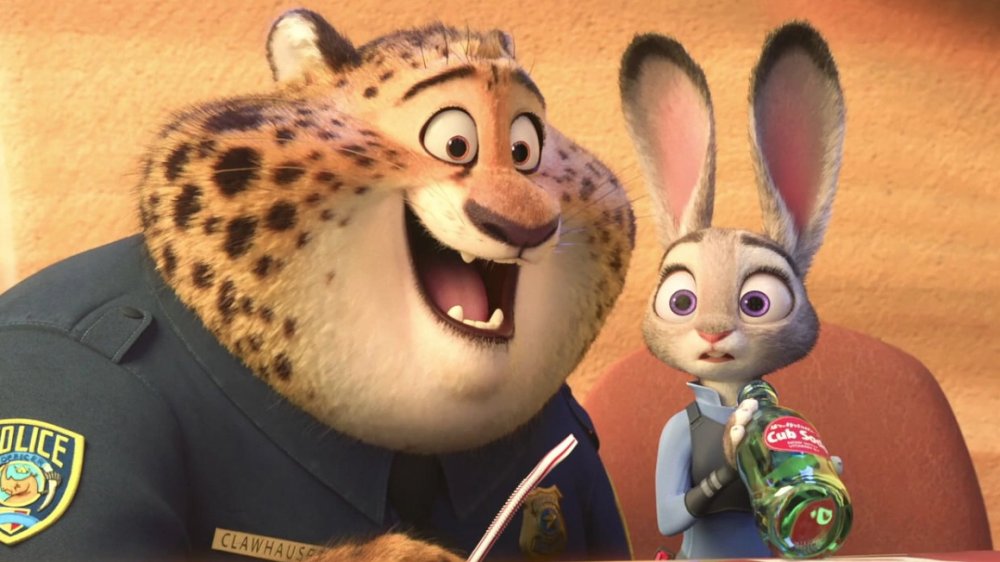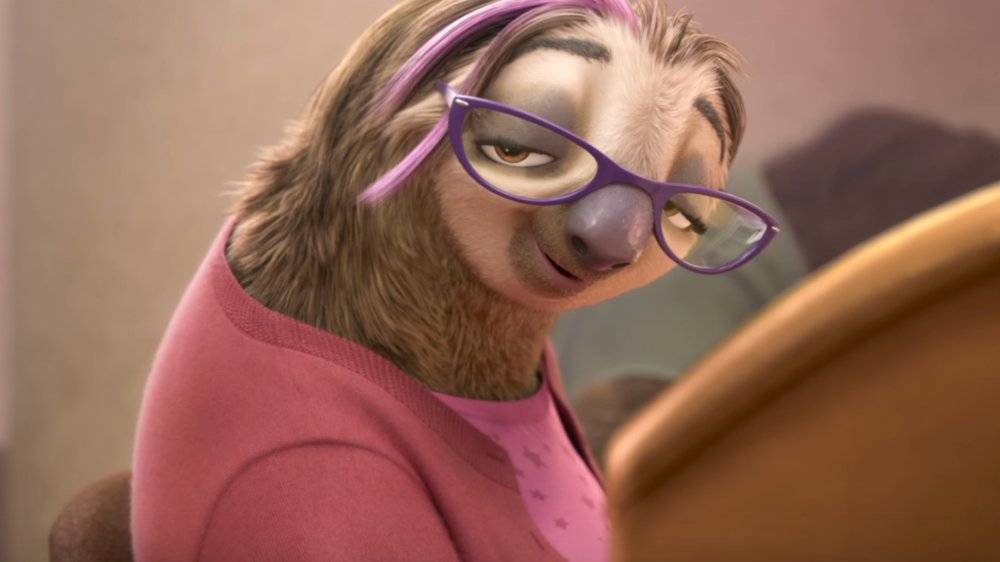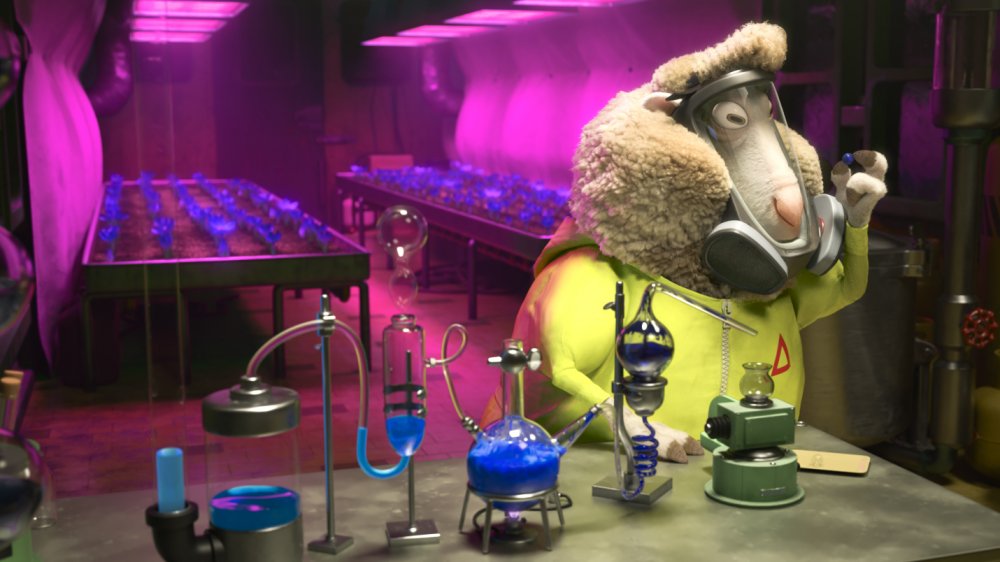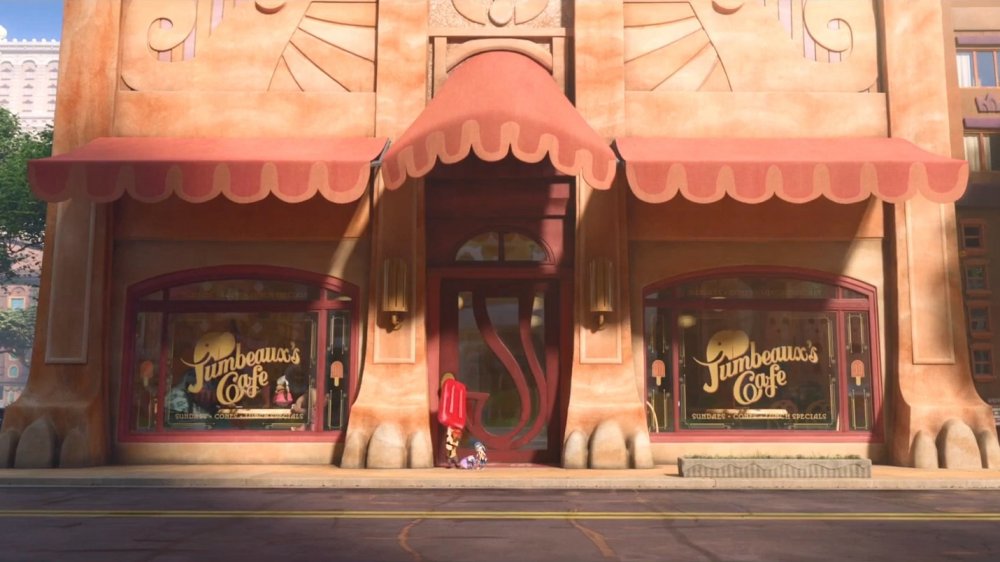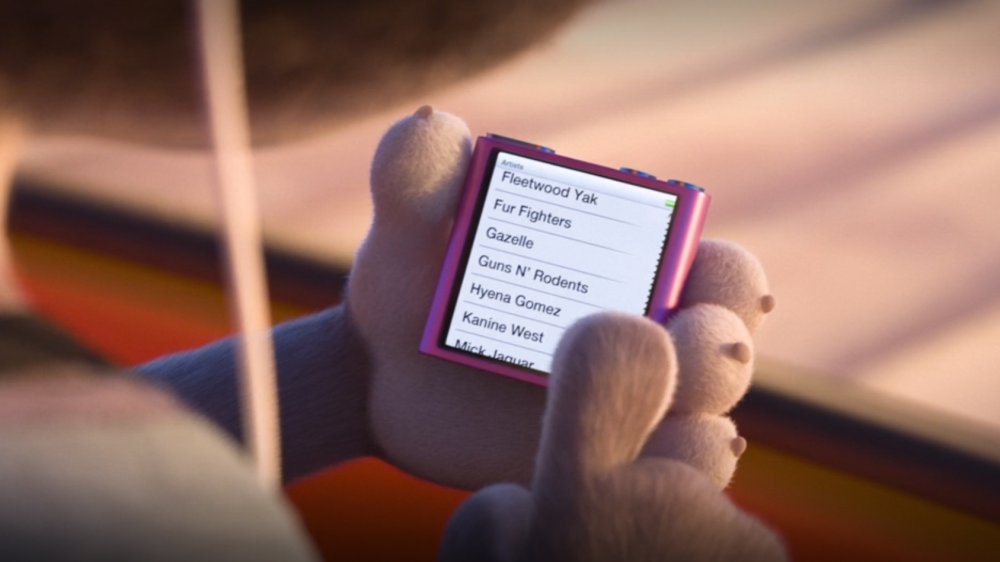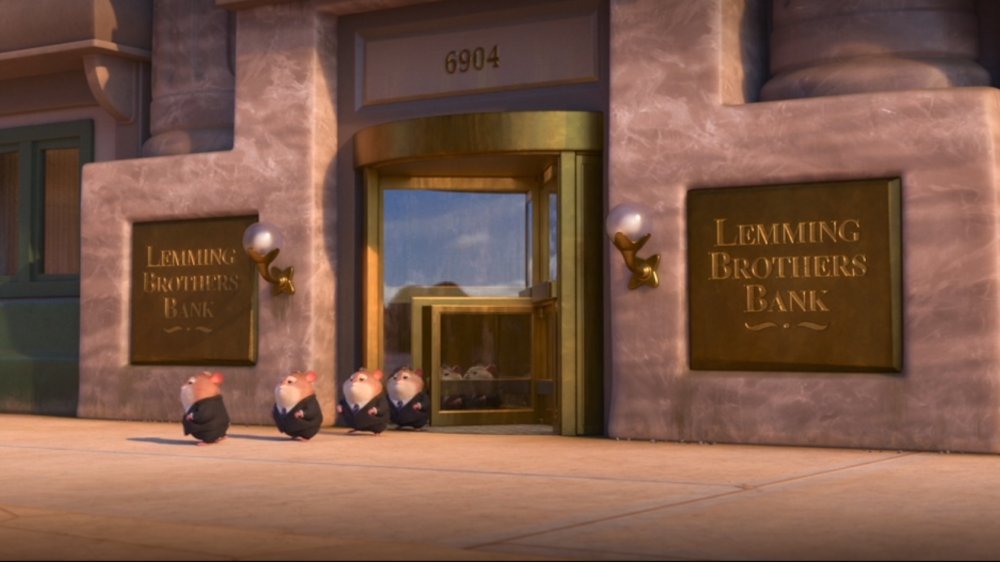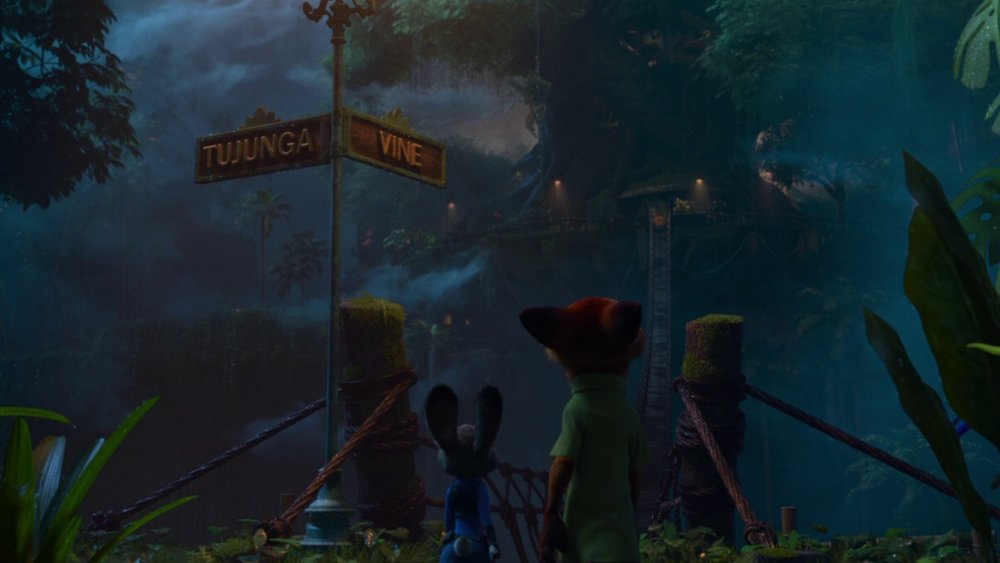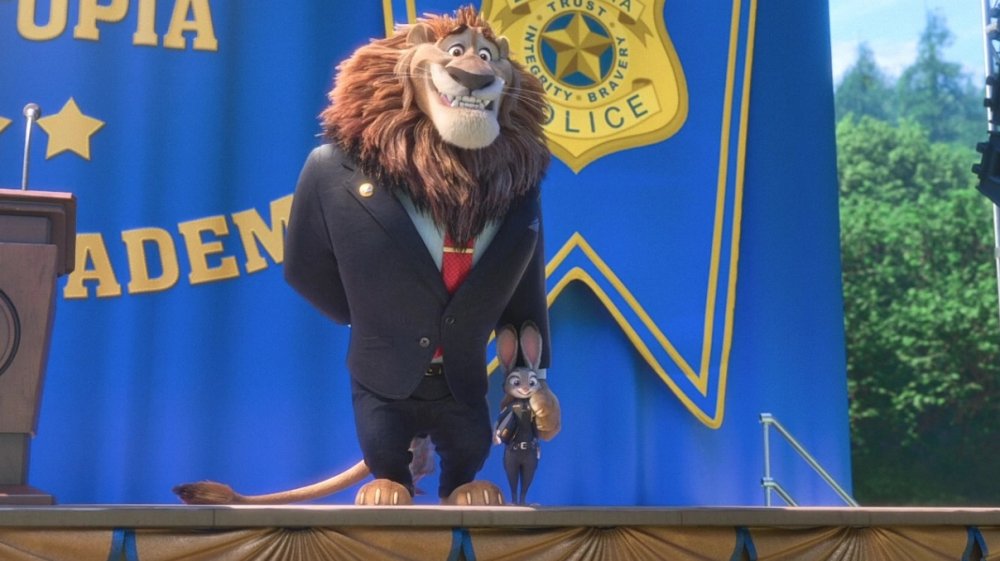Things Only Adults Notice In Zootopia
Released in 2016, Zootopia is a gritty mystery that takes an intrepid cop into the bowels of urban corruption. It's also an animated Disney movie starring an anthropomorphic bunny. That Zootopia knits these two disparate halves into a single whole is impressive on its own. That it does so with a sense of fun, optimism, and humor is dazzling. It's no surprise, then, that Zootopia earned massive critical praise and spectacular returns at the box office. Judy Hopps and Nick Wilde are irresistible leads, their world is a fascinating and hilarious mirror of our own, and man, is that Shakira song that plays throughout the film ridiculously catchy.
One of the things that made Zootopia such a success is how truly all-ages it is. Viewers young and old alike can be entertained by its multifaceted humor and messaging. But only the grown-ups in the audience notice things like Zuber offering "migration at your fingertips," and that's just the tip of the iceberg when it comes to real-world references. We're here to explore everything in Zootopia that sails over younger heads, one cheeky pun, homage, and joke at a time.
Zootopia's multiplying bunnies
Here's a fact nonchalantly dropped by Judy's mother within the first five minutes of the movie — Judy has 275 brothers and sisters. When they see her off on her journey to Zootopia, they take up the entire train platform. But this isn't weird by the standards of Bunnyburrow, Judy's bucolic hometown. As the train passes the town sign, the population count at the bottom is revealed to be constantly ticking upward.
Anyone can laugh at the sheer absurdity of Judy's many cotton-tailed siblings taking up an entire row at the Carrot Days Talent Show. But only the grown-ups in the audience, knowing rabbits' rapid reproduction as both a fact and the source of many raunchy jokes, truly grasp the humor at hand. Interestingly, "multiplying like bunnies" appears to be a bit of a canard within the world of Zootopia. As Judy presses Nick into helping her, she says, eyes wide with faux-innocence, "I am just a dumb bunny, but we are good at multiplying." No wonder Judy doesn't meet many other rabbits in the city — one family would need an entire apartment building to itself.
Nick Wilde vs. the IRS
Nick is, at first glance, every bit the sly fox he appears to be. His sneaky gait, smug sneer, and very-nearly-but-not-quite illegal means of making money are every bit as underhanded as Judy's parents told her to expect from his kind. But Judy manages to snag him in the end. He's never reported any of the under-the-table profits he's made on his taxes. If he doesn't help her out, she promises to put him away with all the might of Zootopia's tax system behind her.
Kids get that Nick is a sketchy dude. But the sheer horror that dawns on his face when Judy plays back the recording she made of him announcing he's earned $200 a day, every day, since he was 12, can only truly be understood by the tax-paying adults in the audience. Sure, breaking the law can incur some major punishments, but the authorities specifically in charge of taxes can blow up your entire life with uniquely devastating power. Nick might be a predator, but he has nothing on the relentless pursuit of the IRS. He's not happy about helping Judy, but he doesn't immediately try to finesse his way out of this the way he does everything else because he knows there's no hustling the tax man once he knows you owe him.
'It's Weaselton!'
Zootopia isn't a movie lacking for shady characters, but Duke Weaselton might just be the shadiest of them all. An outright crook, Judy chases him down after he robs a flower shop, finds him selling bootleg movies on the street, and has to take him to Mr. Big to be threatened into doing anything but sneering at "Flopsy the Copsy."
And yet, he's linked to a man of actual, legitimate power by a sly references. We're talking about Frozen's Duke of Weselton. If that doesn't ring a bell, you might recall him better as the toupee-wearing noble who sweeps Anna onto the dance floor, describing his moves like "a chicken with the face of a monkey." There, he objects to anyone pronouncing his name as "weasel-ton," while Zootopia's Duke corrects anyone who pronounces his name otherwise. His indignation is warranted. Duke is a literal weasel. He's an incredibly fun Easter egg of a character, whose table full of Disney knock-offs, including Wrangled and Pig Hero 6, is as hilarious as it is clearly very illegal. The cherry atop this Disney nerd sundae? Both Dukes are voiced by Alan Tudyk.
Only adults will recognize Tundratown's most feared crime boss
For an upstanding cop, Judy sure does spend a lot of Zootopia consorting with a crime boss. Mr. Big, the ironically named Arctic shrew, is, according to Nick, the most feared gangster in Tundratown. Mr. Big very quickly proves his reputation to be well-earned when he nearly has Judy and Nick "iced" — as in, thrown through a trap door to a frozen pool from which there is no escape. Luckily, his daughter interrupts the proceedings at the perfect moment. It's her wedding day, and she's insisted on no one being "iced" on it, and besides, Judy is the cop that saved her from death by giant donut sign earlier in the movie.
Mr. Big is a flagrant reference to Vito Corleone of The Godfather trilogy. He excoriates Nick for interrupting "the day my daughter is to be married," speaks with a similar weariness, and is whatever the Zootopian equivalent to Italian is, evidenced by his love of cannolis. His daughter, Fru Fru, is a blend of Connie Corleone (Vito's daughter) and Snooki, the bouffant-sporting breakout star of Jersey Shore. She might be all about big hair, big jewelry, and leopard-print jeggings, but Fru Fru has a good heart. She even makes Judy her future child's godmother. Does a Godfather reference seem a little dark for a Disney movie? Not to worry. Mr. Big's voice actor, Maurice LaMarche, has stated that "icing" isn't murder — Mr. Big just "dunks them until they're really sorry."
Why you shouldn't call bunnies cute
Pretty much anyone out of toddlerhood grasps the larger point Zootopia seeks to make. Discrimination is real, and it's wrong. Judy has to work her tail off with a superheroic sense of ingenuity just to get onto the police force and then has to solve a case with impossible speed to be anything but a meter maid. This isn't a new lesson for most kids, even within the world of Disney. For example, Tiana of The Princess of the Frog is told running a business is a bit too much for a "woman of her background," the world writes Aladdin off as a "street rat," and Mulan has to disguise herself as a man to get anything done.
What sets Zootopia apart is its modern-day specificity, much of which goes over the youngest heads. When Clawhauser squeals over how cute Judy is, she very carefully tells him that it's fine for one bunny to call another cute, but that when someone else does it, "it's a little..." This line invokes decades of real-world debate over language and especially patronizing "compliments" that actually just pigeonhole the unlucky recipient. Judy's careful admonishment is very real for much of the audience, as is Clawhauser's immediate embarrassment and apology.
Kristen Bell lives the slow-motion dream in Zootopia
The scene in which Judy and Nick run a plate at the DMV is such a comedic showcase that Disney released it in its entirety to promote the movie. It worked like gangbusters. The fact that the entire building is staffed by sloths is an excellent joke unto itself, but the animation kicks it up another notch. Watching a smile spread with glacial slowness across Flash's face after Nick tells a joke is a tribute to the power of animation in one hysterical shot.
But there's another layer of humor to this scene that most fans probably never notice. Priscilla, the sloth Flash repeats the joke to, is voiced by Kristen Bell. On a 2012 episode of Ellen, Bell revealed some footage shot by her husband, Dax Shepard, on her 31st birthday, for which he'd arranged to have a sloth brought to their house. Bell was so excited that she had a total meltdown. When host Ellen DeGeneres joked a sloth was about to be brought on stage, Bell very nearly started to cry. The love between sloth and woman is very real, apparently, and immortalized forever in Zootopia, though the one brought to Bell's birthday probably doesn't know much about sorting license paperwork.
Breaking B-a-a-a-d
Younger fans giggle in recognition when Chief Bogo tells Judy to "let it go," invoking Frozen's inescapable anthem. But only their parents will catch a reference snuck into the film's final act. Having discovered an illegal lab hidden in a disused subway tunnel, Judy and Nick comb through the equipment as quickly as they can. When Doug, the ram who's been distilling the Night Howlers for Bellwether, returns, Judy and Nick are forced to hide. As Doug takes a call, they overhear him receive his next mark, then cut the caller off when someone bangs on the door, announcing that they've got his latte. "Woolter and Jesse are back," he says, "so I'm leaving now."
Woolter and Jesse are, of course, a reference to Walter White and Jesse Pinkman of Breaking Bad. The names would be enough of a reference on their own, but they're further highlighted by the fact that Doug is wearing the sort of yellow hazmat suit Walter and Jesse often don, and he's refining an illegal substance, just as Walter and Jesse spend most of Breaking Bad doing. Of course, Night Howlers aren't crystal meth, and Walter and Jesse aren't a pair of anthropomorphic rams. Still, these sketchy Zootopians and the stars of Breaking Bad have quite a lot in common.
Old Disney meets modern Disney
Zootopia is a pretty spectacular example of everything modern computer animation is capable of achieving. Recall, if you will, Toy Story. The first entirely computer-animated film, Toy Story was unprecedented when it debuted, but today, it's impossible not to notice how odd the humans look and how flat some of the complex textures of Andy's home appear. Contrast that with Zootopia, in which literally every character is covered in fur that interacts so convincingly with fabric, wind, and sun that rabbits in police uniforms look downright natural.
Yet for all this modernity, Zootopia is full to bursting with references to Disney animation of yore. The ice cream parlor Nick swindles is owned by Jerry Jumbeaux Jr., a reference to Jumbo Jr., Dumbo's given name. Emmitt Otterton's name is a similar nod to a 1977 Muppets holiday special, Emmet Otter's Jug-Band Christmas. Sharp-eyed viewers might notice that the naturalist bears at the Mystic Springs Oasis scratch themselves quite a bit like Baloo does in The Jungle Book. The most well-hidden reference of all comes towards the end of the movie. The rusty train car that houses the Night Howler lab bears a graffito of Oswald the Lucky Rabbit.
The classic sound of Fleetwood Yak
Zootopia's charm lies in just how much it's like our own world. Commutes are a nightmare, office politics are unavoidable, and parents just don't understand why their children want to leave the farm and move to a run-down apartment high-rise in the city's smoggy center. The twist, of course, is that these characters living lives so much like ours are all animals. Commentary on stereotyping ensues, much of it pretty serious-minded. Nick getting muzzled as a kid is an all-too-real evocation of many people's earliest experiences with bigotry.
All of this is what makes the movie a winner. But for all the good lessons and trenchant criticism the movie pulls off, it also mirrors the real world to create some incredible animal-themed jokes. For example, take Judy's iPod. Sharp-eyed viewers might notice she listens to the Fur Fighters, Fleetwood Yak, Ewe 2, Hyena Gomez, Kanine West, and more. We can only imagine how much fun the writers had coming up with these punny names, and we'd love to know how many excellent ones ended up on the cutting room floor.
Too small to fail?
Nick's signature hustle is breathtaking in its complexity. First, he cons a massive popsicle out of an elephant-run ice cream parlor. Then, he melts it on a hot rooftop, re-freezes it into dozens of smaller "pawpsicles" in the snow of Tundratown, sells them on the street to critters in the financial district, and delivers the sticks to a construction site for use as lumber. It's a ballet of law-breaking, and it contains a very pointed joke about some criminals of the real world.
Nick's popsicle customers are lemmings, who, a shot of their marble-clad tower informs us, work for Lemmings Brothers Bank. This is a riff off Lehman Brothers, a financial services firm that was once the fourth-largest investment bank in the United States. However, 2008 brought their reign to an end. Lehman Brothers filed for bankruptcy, exposing their part in the subprime mortgage crisis and sparking the Great Recession. Zootopia takes aim at the infamously "too big to fail" firm by portraying them as the animal most commonly associated with mindless conformity. But hey, at least we get to see Nick swindle them.
Vine and Tujunga
As Judy and Nick dig into the mystery of Emmitt Otterton's disappearance, they receive a white-hot tip. Mr. Manchas, a jaguar living in the Rainforest District at the intersection of Tujunga and Vine, saw him go savage. Thus, the intrepid pair venture into the humid heart of Zootopia's murkiest borough ... but not without an argument over pronunciation. As Judy frantically calls for backup, she tells Clawhauser to send officers to Vine and Tujunga, pronouncing both the "j" and the "g" as one pronounces the the "j" in "jewel." Nick snaps back that it's "Tuh-hunga," with a hard "g" pronunciation on the third syllable.
This is funny on its own, but it's also a deep-cut reference for the animation nerds in the audience. Much of Zootopia was made while the main Disney animation building was being renovated, which meant the team had to work out of the Tujunga Campus. They weren't crazy about this, as the building had some serious plumbing problems, but ultimately, the team did deem the location worthy of an Easter egg.
Zootopia's Mammal Inclusion Initiative
Zootopia is a city that wants to do better by its constituents. Judy experiences this in many ways, but one of the most pointed is her part in the Mammal Inclusion Initiative. At her graduation from the police academy, Mayor Lionheart is proud to announce her as a product of the program, and Assistant Mayor Bellwether is eager to alert him to Judy's success later on, as it proves the Initiative is "really starting to pay off."
This is all well and good. But when Chief Bogo puts her on parking duty, Judy is quick to protest that she's "not some token bunny." This line, when understood in light of the Initiative, creates one of Zootopia's most pointed observations — the dismissal of marginalized people's achievements as the product of inclusive policies. Judy is keenly aware that she can be brushed aside in this way, especially since her name has been publicly tied to the Initiative. But it doesn't matter that she graduated first in her class, wrote 200 parking tickets before noon, or figured out how to take down animals sextuple her size. To those set on disliking her, she's nothing but a jumped-up poser who got a hand-out for being a "dumb bunny."
